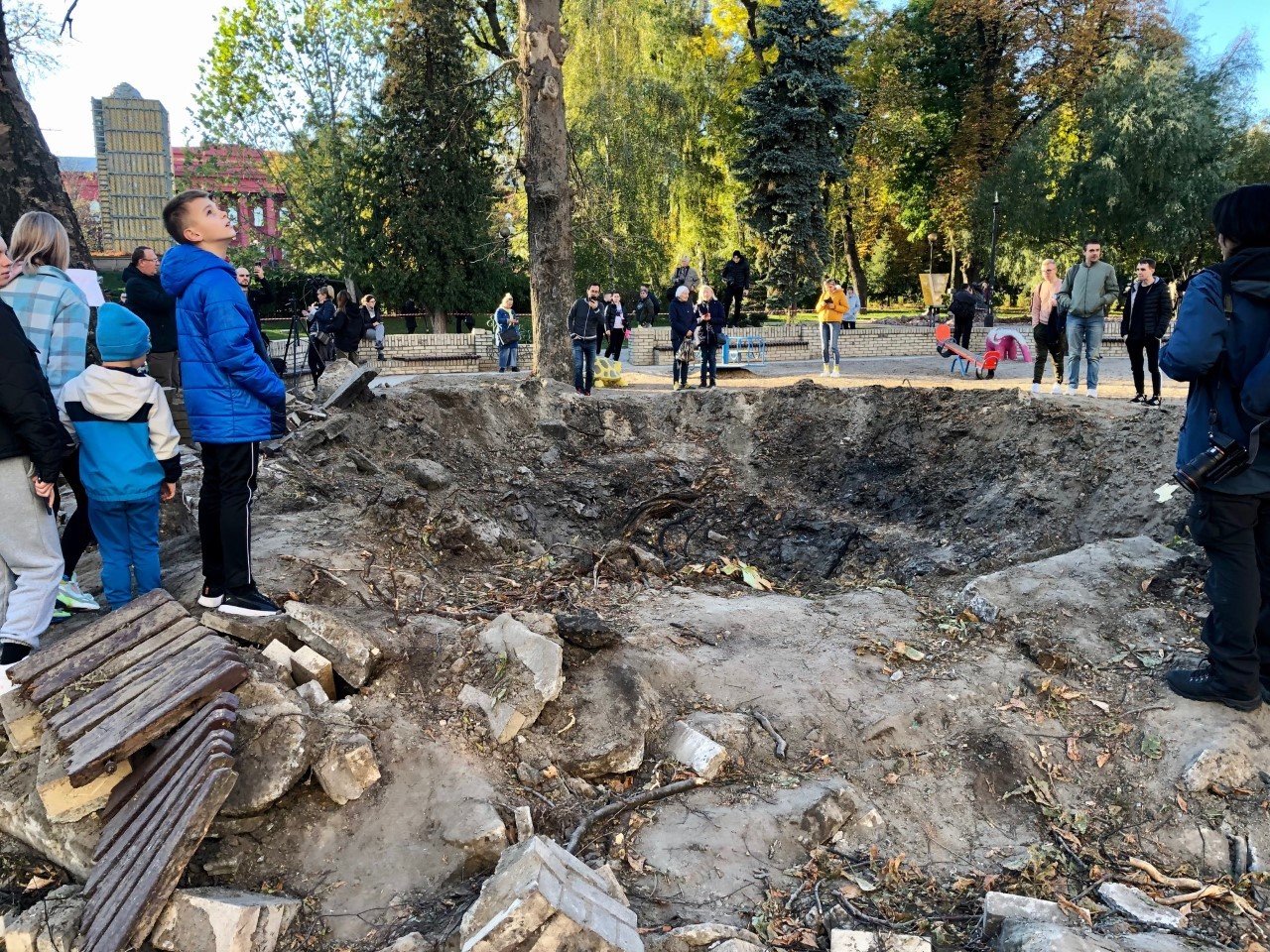
The crater left by a Russian missile, which hit a playground in Kyiv's Shevchenko Park on Oct. 10, 2022. Photo by Nolan Peterson/Coffee or Die.
Another barrage of Russian missiles struck civilian infrastructure sites across Ukraine on Wednesday, Nov. 23, cutting off power and other utilities for millions of Ukrainians. Strikes in the Kyiv region killed four civilians and left large swaths of the capital city without electricity, running water, or internet connectivity. Some residents relied on spotty cellular connection to communicate with the outside world.
In addition to Kyiv, Ukrainian authorities reported power outages in Lviv, Vinnytsia, Kharkiv, Odesa, Dnipro, and other cities across the country. Following Wednesday's strikes, Ukrainain Foreign Minister Dmytro Kuleba said Russia is "waging a cowardly war of terror against civilians."
Due to disruptions in the water supply, Kyiv Mayor Vitaliy Klitschko advised the city’s residents to “stock up” on water. Klitschko recently told the German newspaper Bild that city authorities may evacuate sections of Kyiv where the risk of a complete utilities collapse is highest.
“This is the worst winter since World War II,” Klitschko told Bild, adding that, in his estimation, Russian President Vladimir Putin "wants to terrorize people, forcing them to freeze without light.”
Ukraine’s air force reported that its air defense systems shot down 51 of some 70 Russian missiles launched on Wednesday. Kyiv Oblast Police Chief Andrii Nebytov said the strikes killed four people in the Kyiv region and wounded dozens more. Wednesday’s strikes also spurred power outages in neighboring Moldova.
"Russia has left Moldova in the dark,” Moldovan President Maia Sandu wrote on Facebook.
Recent Ukrainian offensives have turned the war's tide in Kyiv's favor, pushing back Russian forces on the southern and eastern front lines. Russian missiles strikes in central Kyiv on Oct. 10 heralded a new phase of Moscow’s full-scale war in which civilian suffering has become a key military objective. Since then, Russian missile and kamikaze drone strikes have steadily chipped away at Ukraine’s national power grid, as well as other utilities. Periodic blackouts have become a new staple of life in cities across Ukraine.
Kuleba, Ukraine's foreign minister, accused Moscow of reverting to strikes against civilian targets since its troops cannot "win in a fair fight with the Ukrainian army."
Despite deteriorating living conditions, Ukrainian civilian morale remains robust. After Wednesday’s attack, US Ambassador to Ukraine Bridget Brink lauded the Ukrainian people’s resilience.
“More cruel missile strikes across the country as Russia tries to punish Ukraine for daring to be free,” Brink wrote on Twitter. “I have seen the strength of the people of Ukraine, and I know Russia’s attempt to dominate Ukraine by plunging it into the cold and dark will fail. We stand with Ukraine.”
Ukrainian President Volodymyr Zelenskyy requested a meeting of the United Nations Security Council over Wednesday’s Russian strikes.
“I have instructed our ambassador to the UN to request an urgent meeting of the UNSC following today’s Russian strikes. Murder of civilians, ruining of civilian infrastructure are acts of terror. Ukraine keeps demanding a resolute response of international community to these crimes,” Zelenskyy wrote on Twitter.
https://twitter.com/mrsorokaa/status/1595509497279266816?s=20&t=FEcZEci8mmCr2lYG2AMN9g
Ukrainian officials have warned that power outages could last through March, and have told civilians to stock up on warm clothes, water, food, and other supplies. For many civilians, unfamiliar habits now occupy everyday life. Work schedules, as well as trips to the supermarket or gym, must be scheduled around planned blackouts rolling through different city districts. When the power is on, many rush to charge as many gadgets and power banks as possible.
Ukrainian officials have already announced plans to evacuate civilians from the southern city of Kherson. Retreating Russian forces sabotaged the town’s access to power and heating, creating a potential humanitarian crisis as the extreme cold weather of Ukraine’s continental winter approaches.
Addressing Kherson's residents, Deputy Prime Minister Iryna Vereshchuk wrote on Telegram, "You can be evacuated for the winter period to safer regions of the country."
The White House announced $400 million in additional military assistance for Ukraine on Wednesday, including ammunition, arms, and air defense systems. The package also includes generators, underscoring American efforts to help Ukraine through the winter months.
US Secretary of State Antony Blinken wrote Wednesday on Twitter: "Millions across Ukraine took shelter as Russia again rained down missiles today. Continued attacks on infrastructure are designed to keep Ukraine's civilians cold and in the dark. These appalling tactics won't break the resolve of Ukraine and its partners."
Read Next: The Story of Ukraine’s ‘Survived’ Wines

BRCC and Bad Moon Print Press team up for an exclusive, limited-edition T-shirt design!
BRCC partners with Team Room Design for an exclusive T-shirt release!
Thirty Seconds Out has partnered with BRCC for an exclusive shirt design invoking the God of Winter.
Lucas O'Hara of Grizzly Forge has teamed up with BRCC for a badass, exclusive Shirt Club T-shirt design featuring his most popular knife and tiomahawk.
Coffee or Die sits down with one of the graphic designers behind Black Rifle Coffee's signature look and vibe.
Biden will award the Medal of Honor to a Vietnam War Army helicopter pilot who risked his life to save a reconnaissance team from almost certain death.
Ever wonder how much Jack Mandaville would f*ck sh*t up if he went back in time? The American Revolution didn't even see him coming.
A nearly 200-year-old West Point time capsule that at first appeared to yield little more than dust contains hidden treasure, the US Military Academy said.












